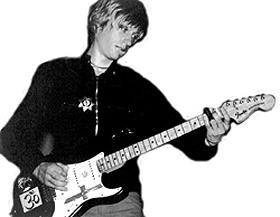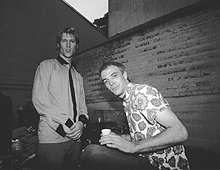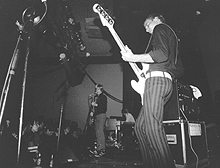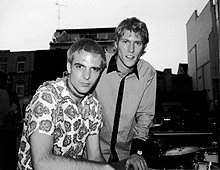
http://www.gaesteliste.de/texte/show.html?_nr=244


PAUL: CRISPIAN (Mills, son of actress HAYLEY MILLS and singer/songwriter of group) and ALONZA had been playing together since the end of school. I met them through an advert in Melody Maker. We played together in a band that wasn't so hot and we decided to move in together in a flat in London. We formed a band called THE KAYS.
ALONZA: That's when JAY (organ, keyboards) came aboard. We spent 3 years playing the clubs in London, learning our trade. We did a lot of recording that time. We had a little 8-track in North London and we'd been recording every week. But we didn't release anything.
So what about the name change and what does it mean? I was under the impression that it was some kind of beverage but ...
ALONZA: It comes from 2 places. We met a guy called Kula Shaker and he was the first Christian devotee in Europe. He said that when he'd been given the name, great luck came his way. He'd been given the name by an Indian swami. The name originates from an Indian emperor, a saintly king called Kula Shaker. We'd changed the spelling a little bit (the original presumably being SHAKAR) so that it was more like a Shaker.
Well, the first KULA SHAKER album is called "K". Then there were THE KAYS. What about the "K"-stuff then?
ALONZA: It's a special letter for us.
PAUL: It's magic.
ALONZA: It's the missing letter in the word magic. Magic used to be spelled with a "k". In old English. They took the "k" off but we're bringing it back, because we think it's sad that it's missing. "K" is also the 11th letter of the alphabet. It's all to do with numerology. We got inspiration coming in from everywhere. So the number 13's another one.
PAUL: Number 10. Knights of the round table.
ALONZA: King Arthur, Krishna, Kylie Minogue of course.
K-Mart?
ALONZA: K-Mart!

ALONZA: The Indian stuff was definitely there for us from the beginning. The first song we ever wrote was called "Govinda". We were just jamming away and the words come from an Indian prayer.
As I mentioned: They toy around with it in a playful way. The sitar sound comes via effects on the guitar, the string-sounds come from an mellotron. How about playing some Indian instruments or inviting Indian musicians?
PAUL: We wouldn't feel that we knew so much as to play Indian instruments. ALONZA plays tabla. He's very good at picking up instruments. We'd bought some Indian instruments though and have them at home, enjoy them.
ALONZA: We fool around with them and try to get a feel out of them but really knowing how to play them is technique, really. Those guys need a lifetime and get to their peak at the age of 40 or 50. You need to dedicate your lifetime to it. And we don't have the time to do that.
Do they enjoy listening to this kind of music then?
ALONZA: The classical music is complicated. It comes across as simple but then the little subtleties make it interesting.
PAUL: CRISPIAN finds it difficult to listen to pop music when he goes home. He just listens to classical Indian music.
ALONZA: It's quite a scientific kind of music the way they have designed it. They have different scales or ragas as they call it. And then you can play it in a different way depending on what mood you're in. Each raga has a different mood, according to the time of day you're playing it. It's all involved.
They do take this seriously, don't they?
ALONZA: It is some fun, but yeah, we do take it seriously. More seriously than we take money and cars and cash-point machines. It's a part of what CRISPIAN is writing about. But not in a heavy or religious or cultish way. The Indian culture is basically the oldest culture of the earth. They had things right. It's certainly not a gimmick. It's something that we're really into.
At this point they do come across seriously enough to be found trustworthy on that matter. It remains to be seen how this thing develops in the future. There have been other musicians before who sought their ultimate experience in Indian mythology. And somehow all of them at one point or another distanced themselves from it. At least to a certain extent. After all: Even Indians are only humans in the long run. But right now, India seems to be the main focus of the Kula Shaker universe. What is "Tattva" all about?
ALONZA: "Tattva" means truth or supreme truth. The line at the beginning of "Tattva" is an aphorism for the school of thought. It's means the simultaneous oneness and difference of reality. The supreme truth. Whereas Buddhism says that we are all one it says that this is true but at the same time we are all individuals. It's kind of a contradiction. That's reflected in the verses of "Tattva". When he sings about the flowers and scents. In a way they are both the same but then they are different.
When reading press reviews about KULA SHAKER you almost certainly come across comparisons with recent English bands such as CHARLATANS or STONE ROSES. I find this a little bit puzzling, because they could be compared more easily to the real stuff. It's not so much that they rip off current British bands, but tend to emulate the less obvious originals. Like PAUL WELLER does, for instance. In their live-show they include a cover of DEEP PURPLE's "Hush", for example.
ALONZA: The British press like to do that.
So where do they see their origins?
PAUL: Our oranges(!) are our own. We are four different guys with four different backgrounds. JAY the hammond-player is a bonafide 60's head. ALONZA's a serious folk-head. I listen to a lot of rock-music and CRISPIAN who's our main songwriter is deeply influenced by Indian stuff. So we've got all kinds of different points.
ALONZA: So it's not like some bands will go for a certain period. We'd never ever do that. I don't like those albums where you have the single with a very defined sound and the other songs which weren't good enough to be singles are just bad versions of the single.
You'd expect that almost, nowadays. After the show someone who hadn't heard the record mentioned that he liked the performance because it didn't all sound like "Tattva". But as PAUL mentioned: There's a lot going on in the music of KULA SHAKER.
ALONZA: An album is something you would listen to from beginning to end and it takes you on a little journey. And we were trying to get at that. As long as we think it sounds good at the day. In the studio we try to get the live feeling. We have played the songs live before a lot.
PAUL: We've been playing that stuff for 3 years.
ALONZA: Some of the stuff we have written the day before we recorded it. Here we hope the spontaneity comes across. A lot of those songs derive from jamming.
PAUL: Taking stuff from jams is great because you can play off each other. But to have jamming as a basis for an album would be disastrous. Luckily we have some discipline there and some good songwriting.
That's what happened with the 2nd STONE ROSES album. They took too much from jamming obviously.
ALONZA: And too much guitars. But, yeah, you have to have songs first, and an arrangements and they didn't have that. The guitar did have a bit of a wank there, if you know what I mean.
PAUL: We are always looking. Finding new things along the way that sound good or are fun to play. A lot of the problems the STONE ROSES had was such a massive gap in between albums and such a lot happening in between. Personal differences, record company, traveling.
Would they set any limits for themselves, musically or would they like to try out everything.
PAUL: We wouldn't try. We are aware, that punk is around and that metal is around...
ALONZA: In our case it's more the attitude of punk, but punk is a bit destructive and we wouldn't want to sound negative. We want our music to be positive.
I would want to avoid the B-word, but their music does sound distinctively British. Any explanation for that phenomenon?
ALONZA: The typical British music is part of the English mentality, the eccentricity. You are influenced by your surrounding in a way, but I don't think that living in a good living-situation makes for good music though. Because we've been living with no money for 3 years. And in a way that drives you more to write good music.
PAUL: We used to live with a busker, busking with him through Europe and he used to say: "A hungry musician is a good musician".
ALONZA: We busked all the way to Spain, we were heading for Morocco. It's good for your playing experience and interacting with people.
That explains a lot, because "K" doesn't sound like your usual debut album. How did the KULA SHAKER sound evolve?
PAUL: It was always there but not nearly as good as today. You might think that we are confused about our direction now: We were really confused about our direction when we started.
ALONZA: We all got our individual style to play our instruments. PAUL got this really loose style, CRISPIAN uses this slide thing and stuff like that.
PAUL: Ambition. Not ambitious as in "We want to be as big as BRIAN ADAMS" but ambitious as in "how much can you do"? It's like in life. Trying, project, you got to give out and grow with the scale of what you can do. That's what I don't like about Brit-Pop. It sounds like everyone's seems to be content.
ALONZA: It's really mundane.
PAUL: We have to grow. On this album we wanted to use strings and brass but weren't allowed to.
Too expensive?

So where do they come from?
ALONZA: I was brought up in West London, where I went to college with CRISPIAN and JAY lives down in South London and PAUL lives in Avalon, Glastonbury. Our first gig was at Glastonbury. We blacked onto the stage and stole some energy. The first song we played was "Govinda".
PAUL: One of the songs in that set was a song that ALONZA wrote it's called "303" and it's on the album.
ALONZA: That's the road that leads from London to Glastonbury - the mystical road, so to say.
Speaking of songs: They seem to have quite a stock of songs to chose from by now. Even the extra tracks on the singles are quite good.
ALONZA: After recording the album we thought that we did. But then we realised that we really needed a lot of B-sides. We chose the best one for the album. It's about giving you value for money. The BEATLES always wrote good B-sides. "Rain" was a classic.
Ah, the BEATLES. What about them?
ALONZA: I really love them, like all of their songs. The time from "Revolver" on especially.
PAUL: I'm not so keen on them. I'm quite unpopular for not being so keen on them. But the songs and words are beautiful.
Okay, one last question: What does CRISPIAN's mother say to her son's music.
PAUL: Well, she's definitely not a big Rock & Roll fan, but she supports CRISPIAN in what he's doing.
And isn't that the most important part?
Fotos: -Ullrich Maurer-
Copyright © 1996 Gaesteliste.de
Alle Rechte vorbehalten
Vervielfältigung nur mit Genehmigung von Gaesteliste.de